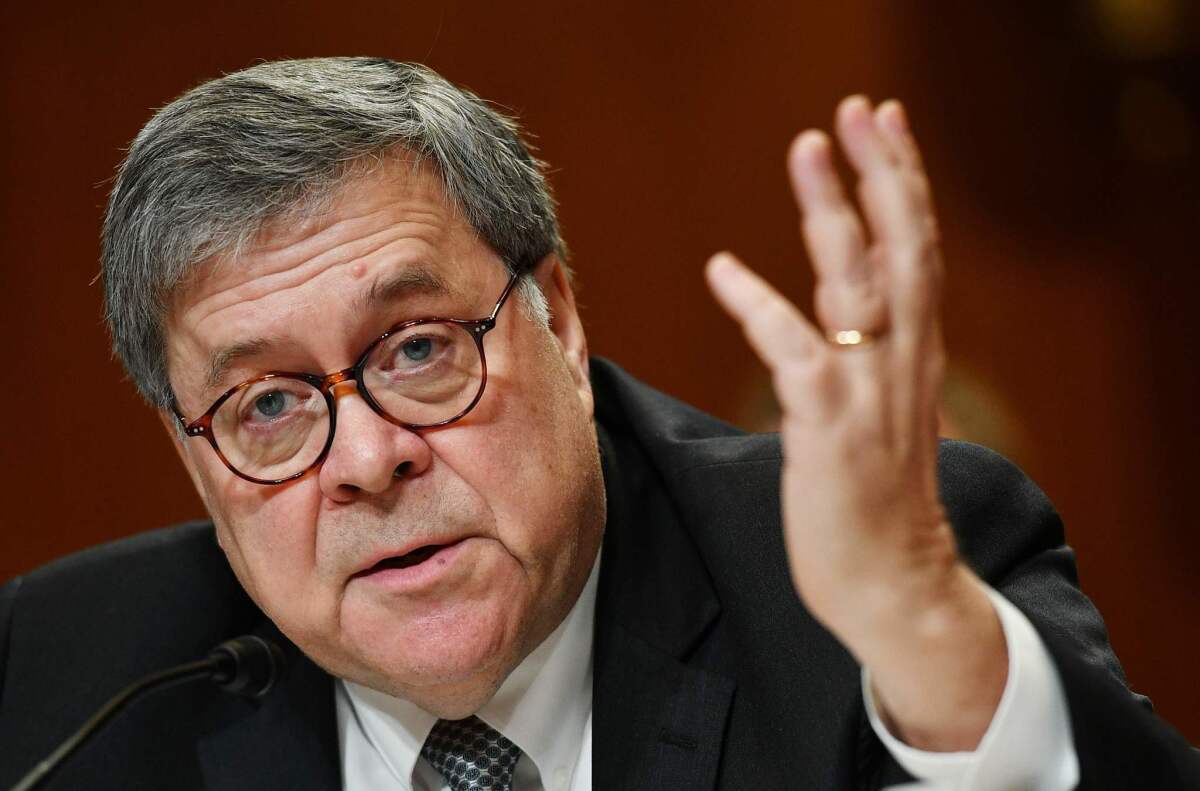Editorial: Barr is the cheerleader Trump needs, but not the attorney general we deserve

- Share via
When President Trump nominated William Barr to be his attorney general, many hoped that Barr’s prior experience in the office (under the first President Bush) and his sense of professionalism would be a bulwark against politicization of the Justice Department. This page supported his confirmation, citing Barr’s promise to allow special counsel Robert S. Mueller III to complete his investigation of possible ties between Russia and the 2016 Trump campaign. But we acknowledged that our support involved a “leap of faith.”
Barr’s tenure hasn’t justified that faith. Rather, he has been an shameless apologist for the president who appointed him.
The attorney general did allow Mueller to complete his investigation. But a letter he sent to Congress summarizing Mueller’s conclusions was so misleading that Mueller wrote to Barr complaining that it “did not fully capture the context, nature and substance” of his investigation.
Since then, Barr has served as an unabashed enabler for Trump’s delusion that the FBI’s search for connections between Russia and the Trump campaign was an unjustified partisan “witch hunt.”
In April, Barr told a Senate committee that he believed that “spying [on the Trump campaign] did occur.” That gave aid and comfort to Trump’s invention of a scandal he called “SPYGATE.”
Barr also took Trump’s side earlier this month after Michael Horowitz, the Justice Department’s respected inspector general, issued a voluminous report about the FBI’s investigation of possible ties between Russia and the 2016 Trump campaign.
Although Horowitz was highly critical of the FBI, he concluded that the investigation was initiated properly and said he had found no evidence that it was opened because of “political bias or improper motivation.” (Horowitz also found no evidence that the FBI had implanted a spy in the Trump campaign.)
Barr rushed to contradict the inspector general. He issued a statement expressing his view that “the FBI launched an intrusive investigation of a U.S. presidential campaign on the thinnest of suspicions that, in my view, were insufficient to justify the steps taken.”
In an interview with NBC, Barr also suggested that, despite Horowitz’ conclusion, political bias might have led to the investigation of figures in the Trump campaign. “I think our nation was turned on its head for three years based on a completely bogus narrative that was largely fanned and hyped by a completely irresponsible press,” Barr said. He asserted that the lack of a satisfactory explanation for the FBI’s mistakes “leaves open the possibility to infer bad faith.”
Those words are music to Trump’s ears, but they are the comments of a political partisan, not the considered comments of a law-enforcement professional. They are the last thing the nation needs from its top lawyer at a time of deep political polarization, when the rule of law is at risk and rational, independent voices are in short supply.
Barr’s comments inevitably will undermine the credibility of actions he already has taken and others he may take in the future.
For example, in his letter to the House and Senate judiciary committees summarizing Mueller’s conclusions, Barr said that, after consulting with Justice Department officials, he and then-Deputy Atty. Gen. Rod Rosenstein had decided that the evidence “is not sufficient to establish that the president committed an obstruction-of-justice offense.” Perhaps that conclusion was based on objective legal analysis, but its credibility — already undermined by Barr’s slanted presentation of Mueller’s findings — will be further compromised by a perception of partisanship created by the attorney general’s own words.
Barr’s comments also cloud his decision to appoint John Durham, the U.S. attorney in Connecticut, to conduct an investigation of the origins of the Trump-Russia investigation — a probe that has been elevated to the status of a criminal investigation. Durham is a respected career prosecutor, but it would be better if he didn’t owe his commission to an attorney general who has abetted Trump’s conspiracy theories.
The issue is not, as one Trump critic framed it, that Barr has placed loyalty to the president above his duty to be “the nation’s lawyer.” In fact, any attorney general has two roles, one as a legal advisor to the president and a member of his Cabinet, the other as the official in charge of federal criminal investigations and prosecutions, which must never be affected by politics.
Jeff Sessions, Barr’s predecessor, actively promoted Trump’s policies, but he also recognized that as prosecutor-in-chief he had to recuse himself from the Russia investigation because of his work in the Trump campaign. That enraged Trump because it led to Mueller’s appointment as special counsel.
Barr also needs to consider the sort of president he’s working for. Trump has attacked the Justice Department, called for his political opponents to be investigated and now has been impeached by the House as a result of his asking Ukraine to investigate Joe Biden, a political rival. The idea of the “rule of law” is alien to him.
And while Barr may protest that he’s not pushing Trump’s personal agenda, Trump brought him up in his notorious July 25 telephone call with Ukrainian President Volodymyr Zelensky. Trump suggested that Zelensky talk not only to his personal lawyer, Rudolph W. Giuliani, but also to Barr.
An attorney general serving in the administration of a president such as Trump must be especially careful and circumspect in his comments. That has not been Barr’s record. If he wants to cheerlead for Team Trump, he should step down from his post and do it as a private citizen.
More to Read
A cure for the common opinion
Get thought-provoking perspectives with our weekly newsletter.
You may occasionally receive promotional content from the Los Angeles Times.










